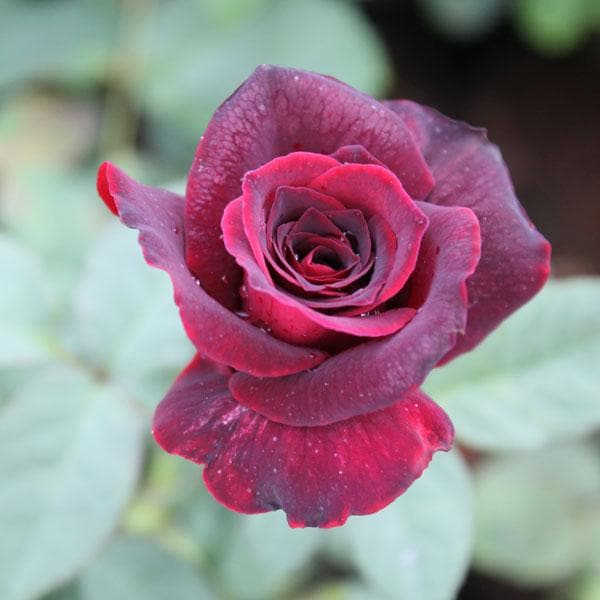
Rose (Maroon) - Plant
(MRP Inclusive of all taxes)
- Shipping ₹79 for entire order
- Country of origin: India

(MRP Inclusive of all taxes)
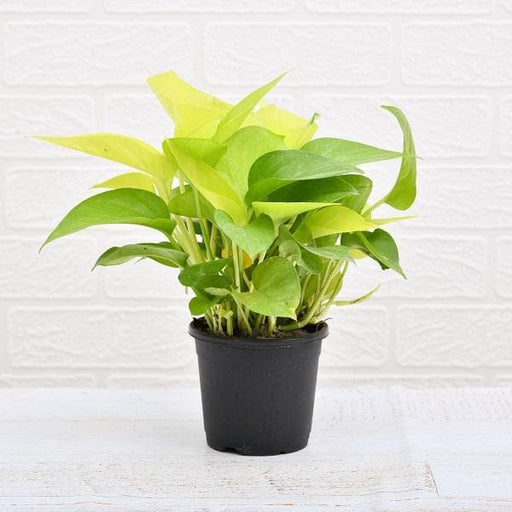 Save 29%
Save 29%
Air Purifier Money Plant with Pot The Air Purifier Money Plant, also known as Pothos or Epipremnum aureum, is a stunning indoor plant that...
View full details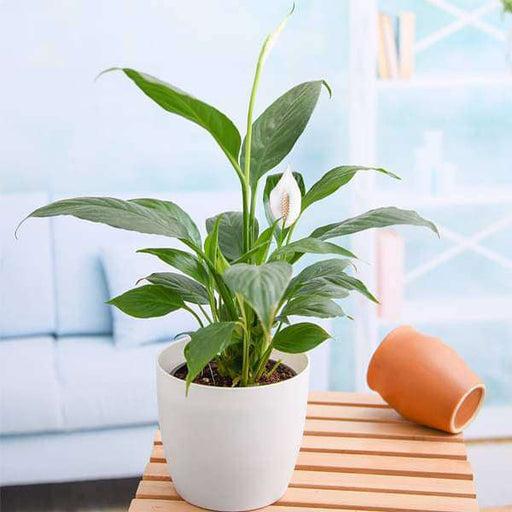
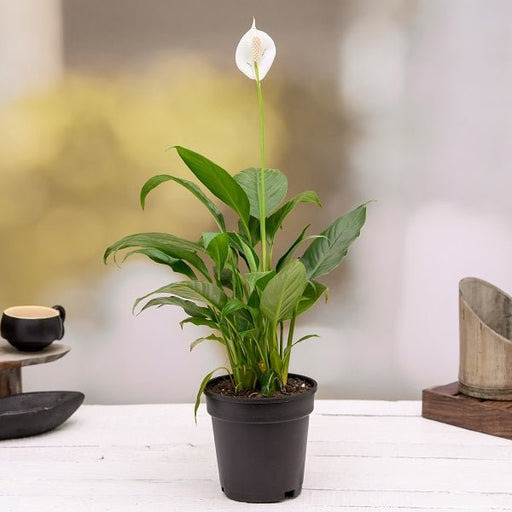 Save up to 15%
Save up to 15%
Peace Lily, Spathiphyllum - Plant The Peace Lily, scientifically known as Spathiphyllum, is a stunning houseplant celebrated for its elegant white...
View full details
 Save 25%
Save 25%
Jasminum sambac, Mogra, Arabian Jasmine - Plant Jasminum sambac, commonly known as Mogra or Arabian Jasmine, is a fragrant flowering plant...
View full details
 Save 18%
Save 18%
Combo Constituents Includes the Parijat Tree (Night-Flowering Jasmine), a culturally significant plant with fragrant flowers. Description The Pari...
View full details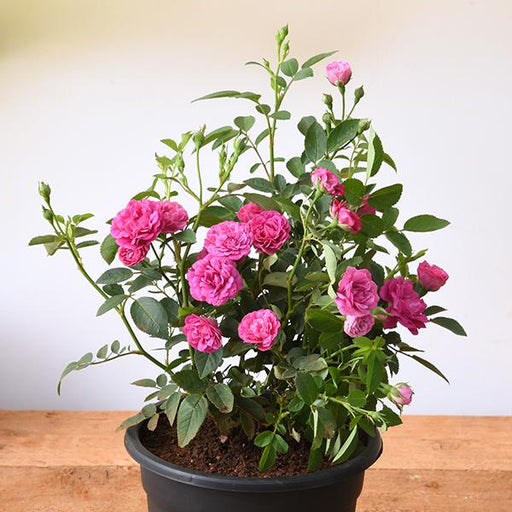
 Save 25%
Save 25%
Miniature Rose, Button Rose (Any Color) - Plant The Miniature Rose, also known as the Button Rose, is a charming and compact flowering plant that ...
View full details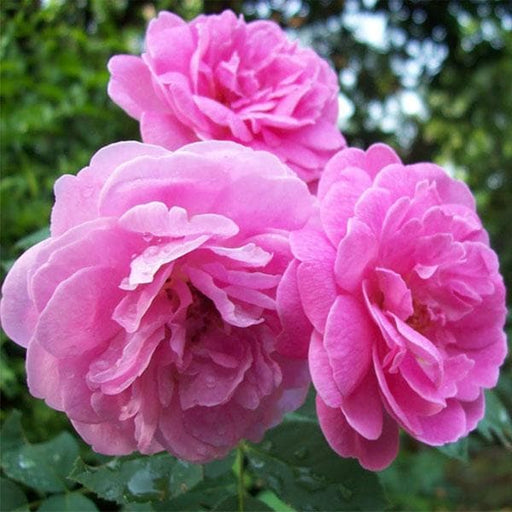 Save 25%
Save 25%
Damascus Rose, Scented Rose (Any Color) - Plant The Damascus Rose, also known as Rosa damascena, is a timeless symbol of beauty and romanc...
View full details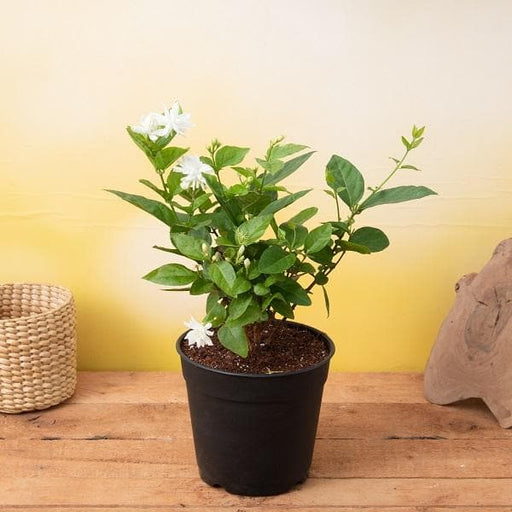
 Save 17%
Save 17%
Beautiful Fragrant Mogra, Arabian Jasmine Plant with Pot The Beautiful Fragrant Mogra, also known as Arabian Jasmine (Jasminum sambac), is...
View full details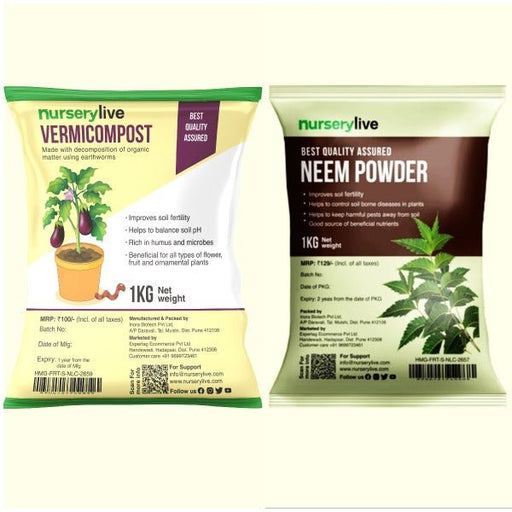 Save 15%
Save 15%
Pack of Vermicompost and Neem Cake for House Plants Transform your indoor garden with our premium Pack of Vermicompost and Neem Cake, spec...
View full details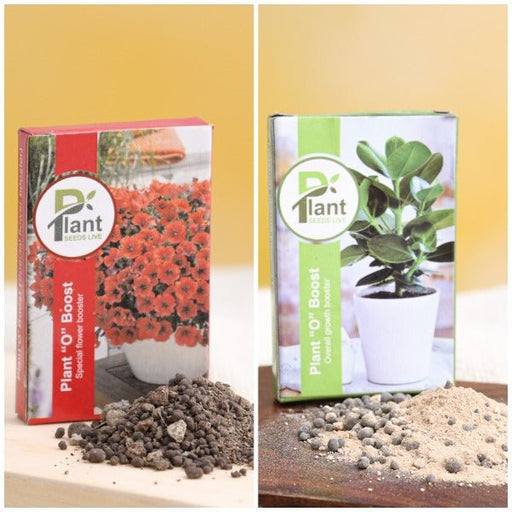
Pack of Plant Growth and Flower Boosters Unlock the full potential of your garden with our Pack of Plant Growth and Flower Boosters! This ...
View full details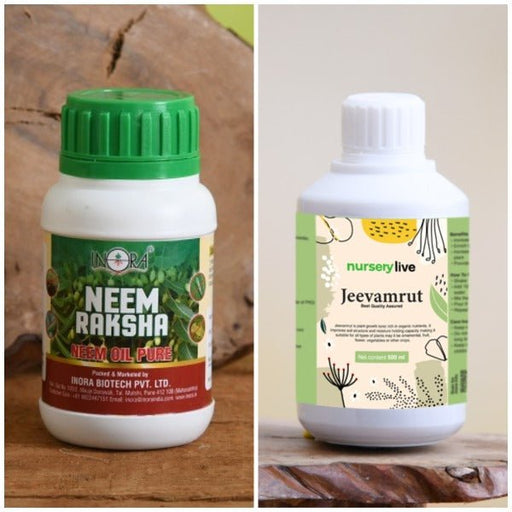 Save 38%
Save 38%
Combo of Jeevamrut and Neem Raksha for Easy Growth and Protection of Houseplants Transform your indoor garden with our exclusive combo of ...
View full details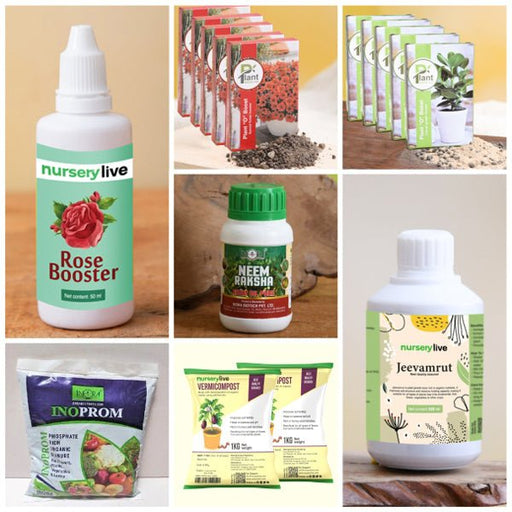 Save 22%
Save 22%
Plant Nutrients Kit (Pack of 16) for a Healthy Garden Transform your garden into a lush paradise with our Plant Nutrients Kit, featuring 1...
View full details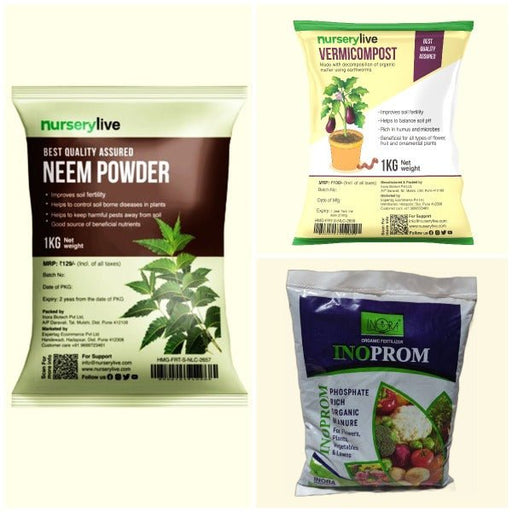 Save 16%
Save 16%
Combo of Top Plant Fertilizers Elevate your gardening game with our exclusive Combo of Top Plant Fertilizers, featuring two bags of premiu...
View full details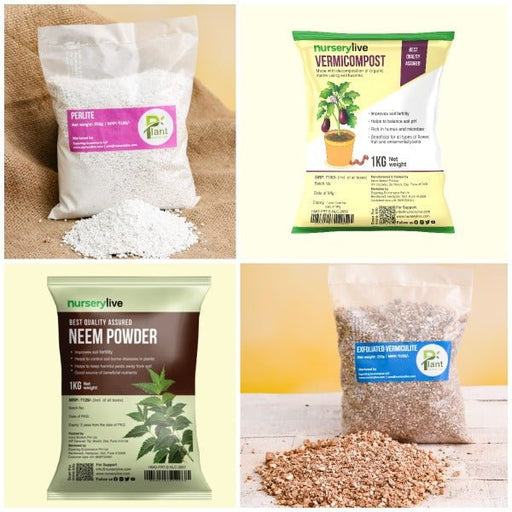 Save 24%
Save 24%
Pack of 4 Additives to Make Soil Healthy and Nutrient Rich Transform your garden into a thriving ecosystem with our Pack of 4 Additives de...
View full details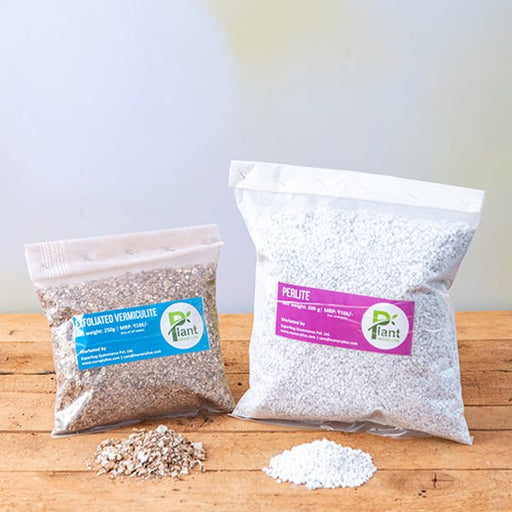 Save 30%
Save 30%
Transform your gardening experience with our premium Combo of Perlite and Vermiculite. This unique blend is designed to enhance soil aeration and ...
View full details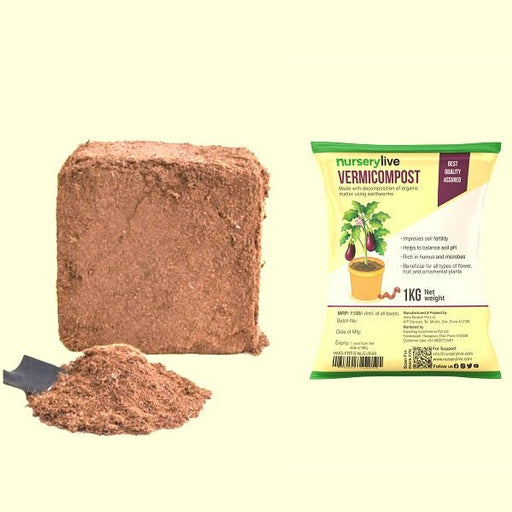 Save 27%
Save 27%
Combo of 2 Vermicompost and Cocopeat - Enrich Your Soil Naturally! Transform your garden into a thriving ecosystem with our Combo of 2 Ver...
View full details
 Save 35%
Save 35%
Best 6 Plants for Perfect Indoor Garden Transform your living space into a lush oasis with our curated collection of the Best 6 Plants for a...
View full details
 Save up to 50%
Save up to 50%
Mini Succulent Garden Pack Transform your space with our Mini Succulent Garden Pack, featuring a delightful collection of 4 any variety beautiful s...
View full details
 Save 30%
Save 30%
5 Best Fragrant Plants Transform your garden or indoor space into a fragrant paradise with our curated selection of the 5 Best Fragrant Plants. Th...
View full details
 Save 24%
Save 24%
Set of 2 Bonsai Looking Grafted Adeniums Transform your indoor or outdoor space with our exquisite Set of 2 Bonsai Looking Grafted Adenium...
View full details Save 45%
Save 45%
Top 4 Die Hard Succulents Pack Transform your indoor or outdoor space with our Top 4 Die Hard Succulents Pack, featuring a curated selecti...
View full details
 Save 30%
Save 30%
5 Best Indoor Plants Pack Transform your living space into a lush oasis with our '5 Best Indoor Plants Pack.' This carefully curated collection fe...
View full details
 Save 25%
Save 25%
Set of 4 Evergreen Air Purifier Plant Pack Transform your indoor space into a lush, green oasis with our Set of 4 Evergreen Air Purifier Pla...
View full details| SrNo | Item Name | Qty |
|---|---|---|
| 2 | Rose (Maroon) Plant | 1 |
The Maroon Rose is a stunning addition to any garden, known for its deep, rich color and captivating fragrance. This perennial plant, scientifically known as Rosa spp., thrives in various climates and is cherished for its beauty and symbolism of love and passion. With its velvety petals and robust growth, the Maroon Rose is not just a flower; it's a statement piece that enhances any landscape.
What makes the Maroon Rose special is its unique hue, which symbolizes deep love and respect. This variety stands out among other roses, making it a favorite for special occasions and romantic gestures. Its enchanting fragrance and long-lasting blooms make it a perfect choice for both gardens and floral arrangements.
Special features of the Maroon Rose include its disease resistance and ability to thrive in various soil types. This hardy plant can withstand drought conditions once established, making it an eco-friendly choice for sustainable gardening. Additionally, its blooms attract pollinators, contributing positively to the environment.
Caring for your maroon rose plant is like nurturing a diva; it requires attention, love, and just the right amount of sunlight. These beauties thrive in well-drained soil and prefer a sunny spot, so make sure to give them the royal treatment. Water them regularly, but don’t drown them—think of it as a spa day, not a water park. Pruning is essential, so channel your inner gardener and snip away those dead blooms to encourage new growth. With a little TLC, your maroon rose will flourish and reward you with stunning blooms that will make your neighbors green with envy.
When it comes to maroon roses, variety is the spice of life! From the velvety petals of the ‘Black Baccara’ to the striking ‘Dark Night,’ each variety has its own personality. Some are bold and dramatic, while others are subtle and sophisticated. Choosing the right maroon rose for your garden is like picking the perfect outfit for a gala—make sure it matches your style! These varieties not only add depth to your garden but also serve as conversation starters. So, whether you’re a romantic at heart or a lover of the dramatic, there’s a maroon rose variety just waiting to steal the show.
Planting a maroon rose is like setting the stage for a grand performance. Choose a location with plenty of sunlight, as these beauties love to bask in the limelight. Dig a hole that’s twice as wide as the root ball, and don’t forget to mix in some compost for that extra oomph! When placing the plant, make sure the graft union is just above the soil line—think of it as giving your rose a comfy bed to sleep in. Water thoroughly after planting, and give it a little pep talk to encourage growth. With these tips, your maroon rose will be ready to take center stage in no time!
Fertilizing your maroon rose is like feeding a growing artist; they need the right nutrients to create their masterpiece. Use a balanced fertilizer during the growing season to ensure your rose gets all the essential vitamins and minerals it craves. Think of it as a gourmet meal for your plant—rich in nitrogen, phosphorus, and potassium. Just remember, moderation is key; too much fertilizer can lead to a dramatic meltdown. Apply it every 4-6 weeks, and watch as your maroon rose transforms into a blooming work of art that will leave everyone in awe.
Every maroon rose has its fair share of drama, especially when it comes to pests and diseases. Aphids, spider mites, and powdery mildew are the uninvited guests that can crash your rose party. But fear not! A little neem oil or insecticidal soap can send them packing. Regularly inspecting your plant is like keeping an eye on the guest list—catching issues early can save you from a full-blown crisis. And remember, a healthy maroon rose is less likely to fall victim to these pests, so keep up with your care routine and let your rose shine without interruptions.
Pruning your maroon rose is akin to giving it a stylish haircut; it’s all about shaping and enhancing its natural beauty. The best time to prune is in early spring, just as the buds begin to swell. Grab your sharpest shears and start by removing any dead or diseased wood—think of it as decluttering your rose’s closet. Aim for an open center to allow sunlight and air to circulate, promoting healthy growth. Don’t be afraid to cut back those long stems; it’s all part of the makeover! With the right techniques, your maroon rose will be the belle of the ball, blooming beautifully all season long.
Pairing your maroon rose with the right companions is like assembling a dream team; they can enhance each other’s beauty and health. Consider planting lavender or salvia nearby; their fragrant blooms not only look stunning together but also attract beneficial pollinators. Marigolds are another great choice, as they can help deter pesky pests. Just like a good friendship, these plants will support each other, creating a vibrant garden scene. So, don’t be shy—mix and match your maroon rose with these fabulous companions for a garden that’s bursting with color and life.
Designing a garden with maroon roses is like curating an art gallery; every element should complement the others. Use contrasting colors like yellows and whites to make those deep maroon petals pop. Consider varying heights by placing taller plants behind your roses, creating a
A Maroon Rose Plant is a stunning flowering shrub known for its deep, rich maroon blooms. These beauties not only add a touch of elegance to your garden but also attract pollinators. Think of them as the sophisticated guests at your garden party, always dressed to impress!
Caring for a Maroon Rose Plant is like nurturing a diva. They love well-drained soil, plenty of sunlight, and regular watering. Prune them to keep their shape and remove dead blooms. Just remember, a little pampering goes a long way in keeping them happy and blooming!
Maroon Roses thrive in loamy, well-drained soil with a pH of 6.0 to 6.8. Think of it as their five-star hotel—comfortable and just right! Adding organic matter can enhance drainage and nutrients, ensuring your roses feel like royalty in their garden abode.
Water your Maroon Rose Plant deeply once a week, or more during hot spells. They prefer their roots to be moist but not soggy—like a well-balanced cocktail! Just remember, overwatering can lead to root rot, which is a party crasher for your lovely blooms.
Maroon Roses typically bloom from late spring to early fall, putting on a show that rivals any summer blockbuster. With proper care, you can enjoy their stunning flowers for months. Just be ready to take plenty of pictures; these beauties love the spotlight!
Absolutely! Maroon Roses can thrive in pots, making them perfect for patios or balconies. Just ensure the pot has drainage holes and is large enough for their roots to stretch. With the right care, your potted Maroon Rose will be the talk of the town!
Like any glamorous plant, Maroon Roses can attract pests such as aphids and spider mites. But fear not! Regular inspections and natural remedies like neem oil can keep these uninvited guests at bay. After all, no one likes a pest crashing their garden party!
Fertilize your Maroon Rose Plant with a balanced rose fertilizer in early spring and again in mid-summer. Think of it as giving them a gourmet meal to fuel their fabulous blooms. Just follow the package instructions, and your roses will thank you with vibrant flowers!
Yes, you can propagate Maroon Roses through cuttings! Take healthy stems in late spring, dip them in rooting hormone, and plant them in moist soil. With a little patience and care, you’ll have new plants ready to strut their stuff in no time!
Maroon Roses can face diseases like black spot and powdery mildew. But don’t fret! Regular pruning, good air circulation, and fungicides can keep these pesky issues at bay. Think of it as giving your roses a protective shield against the garden gremlins!
Prune your Maroon Rose Plant in late winter or early spring, removing dead or weak stems. Aim for an open center to improve air circulation. It’s like giving your roses a stylish haircut—just the right trim to keep them looking fabulous and ready to bloom!
Yes, Maroon Roses are often delightfully fragrant, adding a sensory treat to your garden. Their scent can vary by variety, but many have a sweet, classic rose aroma. So, get ready to stop and smell the roses—your garden will be a fragrant paradise!